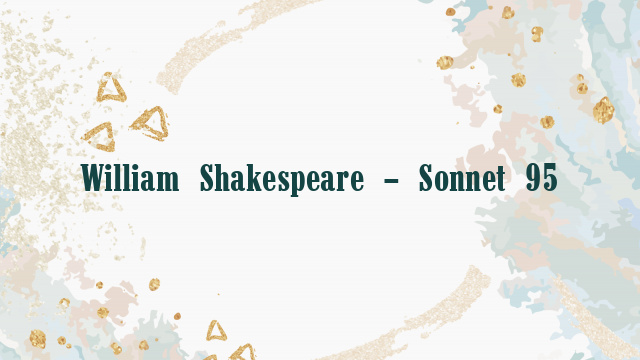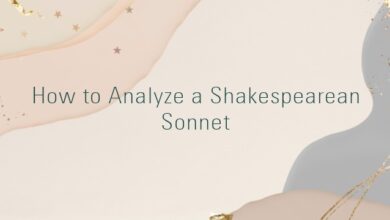
William Shakespeare – Sonnet 95
How sweet and lovely dost thou make the shame
Which, like a canker in the fragrant rose,
Doth spot the beauty of thy budding name!
O! in what sweets dost thou thy sins enclose.
That tongue that tells the story of thy days,
Making lascivious comments on thy sport,
Cannot dispraise, but in a kind of praise;
Naming thy name blesses an ill report.
O! what a mansion have those vices got
Which for their habitation chose out thee,
Where beauty’s veil doth cover every blot
And all things turns to fair that eyes can see!
Take heed, dear heart, of this large privilege;
The hardest knife ill-used doth lose his edge.
�This sonnet continues to snipe at the young man’s morals, although his backsliding is given a far more attractive gloss than previously. It is clearly an integral part of this mini-sequence of sonnets dealing with deception and betrayal which runs from 91 to 96. But now all has become sweet and lovely, at least on the surface. The positive words of implicit praise, sweet, lovely, fragrant rose, beauty, budding name, sweets, kind of praise, blesses, mansion, beauty’s veil, all things fair, far outnumber the negative cankers. Against this army of noble, though perhaps too sugary kinsfolk, the vices, blots and festering of dissipation do not make much headway. All is swallowed in the young man’s merits and beauty, and the closing couplet seems rather weak in its admonitory power. The youth is not likely to change his spots, nor is the knife of sharpest metal likely to be thrown away.
The 1609 Quarto Version
HOw ſweet and louely doſt thou make the ſhame,
Which like a canker in the fragrant Roſe,
Doth ſpot the beautie of thy budding name?
Oh in what ſweets doeſt thou thy ſinnes incloſe!
That tongue that tells the ſtorie of thy daies,
(Making laſciuious comments on thy ſport)
Cannot diſpraiſe,but in a kind of praiſe,
Naming thy name, bleſſes an ill report.
Oh what a manſion haue thoſe vices got,
Which for their habitation choſe out thee,
Where beauties vaile doth couer euery blot,
And all things turnes to faire,that eies can ſee!
Take heed(deare heart)of this large priuiledge,
The hardeſt knife ill vſ’d doth looſe his edge.
Commentary
1. How sweet and lovely dost thou make the shamethe shame – precisely what the shame is is not specified, but references to wantoness in the next sonnet and deception in 92 and 93 imply that sexual appetite and a disposition to roam are the heart of the problem.2. Which, like a canker in the fragrant rose,

No more be grieved at that which thou hast done:
Roses have thorns, and silver fountains mud;
Clouds and eclipses stain both moon and sun,
And loathsome canker lives in sweetest bud. 35
So thou be good, slander doth but approve
Thy worth the greater, being woo’d of time;
For canker vice the sweetest buds doth love,
And thou present’st a pure unstained prime. 70
The fragrant rose is the epitome of all things beautiful, as in the earlier procreation sonnets, 1-20, and it stands here for the youth and his beauty. The Q text capitalises the initial letter, but does not italicise it, as in Sonn.1.3. Doth spot the beauty of thy budding name!Doth spot – this continues the idea of a stain, blot, blemish or disease, introduced in the couplet of 92, then continued with Eve’s apple, the festering lilies and here expanded as an image of canker in rosebuds. The ‘blot’ imagery is reinforced in line 11.
thy budding name = you, who are still in the prime of youth; you, whose reputation (name) is still in its infancy (budding), and therefore in danger of being corrupted.4. O! in what sweets dost thou thy sins enclose.sweets = sweet things (appearance, grace, beauty, lively character etc.)
enclose = shut in, hide; disguise.5. That tongue that tells the story of thy days,That tongue that tells = whoever might choose to tell;
the story of thy days = the record of your life. Compare for example:
……….For Brutus’ tongue
Hath almost ended his life’s history. JC.V.5.39-40.6. Making lascivious comments on thy sport,This line recalls
Lascivious grace, in whom all ill well shows, 40.
The lascivious comments presumably are those made by his friends commenting on the youth’s sexual prowess. Compare also:
While comments of your praise, richly compiled,
Reserve their character with golden quill 85.
comments were expository treatises, or commentaries; or remarks and criticisms (OED 1 & 2a.). In this case the latter meaning is evident.
sport = wantonness, sexual delights and escapades.7. Cannot dispraise, but in a kind of praise;The subject of this line is that tongue of line 5. The dispraise presumably would involve mention of the youth’s vices, but merely mentioning him is itself a form of praise, and wipes out the evil reputation which would otherwise follow from his vicious conduct.8. Naming thy name blesses an ill report.an ill report = a damning account of your activities. Modern punctuation tends to isolate this line, making it into a sort of summary of the previous three lines. The Q punctuation tends more towards the meaning ‘Any tongue that speaks of you cannot dispraise you, but merely by citing your name it praises you and thus gives grace and elegance to what would otherwise be a damaging account of you’.9. O! what a mansion have those vices gotthose vices – the shame of line 1, and the sport of line 6.10. Which for their habitation chose out thee,chose – although Q has chose, I suspect that choose is equally probable, on the analogy of loose and lose, (see line 14) which are indeterminate in spelling. choose would preserve the immediacy and urgency of the present tenses of doth cover, turns, can see, as well as have got, which equates to ‘do possess’. On the other hand the past tense suggests an ingrained vice, a disposition to be wanton, which perhaps the poet also wishes to imply, so that both chose and choose are equally valid.11. Where beauty’s veil doth cover every blotblot echoes the use of the word in 92:
But what’s so blessed-fair that fears no blot?
and also recalls the canker that spots the youth’s beauty in line 3. blots are caused by the shames and vices of the youth’s sexual escapades, in the same way that sin is envisaged as staining the immortal soul. Perhaps also a reference to the physical decay caused by syphilis.12. And all things turns to fair that eyes can see!turns – the subject appears to be beauty’s veil, which converts everything, including the stain of vice, to a fair appearance. However all things could also be the subject, as third person plurals ending in ‘s’ were not uncommon. turns would then be an intransitive verb, the meaning being that ‘all things connected with you become fair and beautiful, whatever the circumstances’.
that eyes can see – while this ostensibly refers to all things, it is more like a sting in the tail, and undermines the glory of the outward appearance with the suggestion of a gnawing canker which is destroying all inwardly, a canker which is all the more destructive for being unseen.13. Take heed, dear heart, of this large privilege;Take heed = beware, be careful, take warning.
large privilege = extensive freedom, unrestricted permit to be licentious (because criticism has no force, and becomes mere praise). large has the meaning of ‘at large, unrestricted’. Compare:
To tie up envy evermore enlarged 70.
dear heart – the personal note softens the edge of the otherwise harsh criticism, and implies by its intimacy that the speaker has the right to offer advice.14. The hardest knife ill-used doth lose his edge.
Possibly proverbial. Frequent use of anything makes it less efficacious.
ill used = badly used, maltreated.
his edge = its sharpness. Contains also some bawdy innuendo, similar to that in Hamlet:
OPH. You are keen, my Lord.
HAM. It would cost you a groaning to take off my edge. Ham.III.2.244-5.
Note also the simile used in line 4 of the opening Quatrain of 52, and see the note thereon.
So am I as the rich, whose blessed key
Can bring him to his sweet up-locked treasure,
The which he will not every hour survey,
For blunting the fine point of seldom pleasure. (Sonnet 52)






